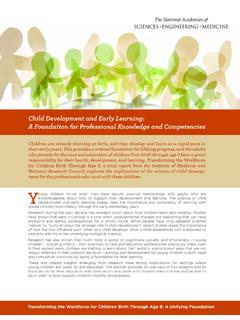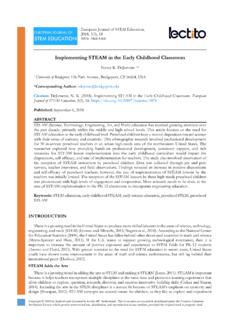Transcription of Mother Tongue, a Necessary Step to Intellectual …
1 Pan-Pacific Association of Applied Linguistics 12(2), 25-3625 c 2008 PAAL 1345-8353/00 Mother Tongue, a Necessary step to Intellectual development Rezvan Noormohamadi Islamic Azad University of Tehran, Science and Research Branch Noormohamadi, R. (2008). Mother tongue, a Necessary step to Intellectual development . Journal of Pan-Pacific Association of Applied Linguistics, 12(2), 25-36. Intellectual (cognitive) development , the emergence of increasingly sophisticated forms or levels of understanding, reasoning, and rationality is an ongoing process of reflection, coordination, and social interaction that begins in early childhood and continues, at least in some cases, long into adulthood (Moshman, 2003).
2 In this process, language is a primary tool in the entire life. However, it is not to say that thinking (as an Intellectual ability) cannot take place without language (Munn, 1951), but rather mostly, thinking is mediated by language and thus develops to a much higher level of sophistication. The intimate link between language and cognitive development forms the core of the present article. It focuses on the important contribution of Mother tongue in the process of cognitive development . Two major theories of development : Piaget and Vygotskys' views are investigated in relation to language.
3 It is concluded that, although thought is the base, language intellectualizes it to a great deal. Key Words: Mother tongue, Intellectual development 1 Introduction Mother tongue (first language, native language, or L1) is essential for learning as a part of Intellectual ability. Mother tongue is the language human beings acquire from birth. It helps the child in his/her mental, moral, and emotional development . Schick, de Villiers, and Hoffmeister (2002) in their study explain that language delays typically observed in deaf children are causally related to delays in major aspects of cognitive development .
4 They maintain, children who cannot understand complex syntactic forms like complements have difficulty understanding how their own thoughts and beliefs may differ from those around them. In fact, much of a child's future social and Intellectual development hinges on the milestone of Mother tongue (Plessis, 2008). Mother tongue, therefore, has a central role in education that demands cognitive development . The role of Mother tongue in education Education is a potential instrument for encouraging independent thinking among the learners. Students should be allowed and encouraged to come up with their own opinions and interpretations of events around them.
5 The curriculum for primary Noormohamadi26school / elementary school in Mother tongue, emphasizes the importance of the individual's personal and Intellectual development . Studies show that children who come to school with a solid foundation in their Mother tongue develop stronger literacy abilities. Overall, the research is very clear about the importance of children's Mother tongue for their personal and educational development (Baker, 2000; Cummins, 2000; Skutnabb-Kangas, 2000 cited in Cummins, 2000). When parents spend time with their children and tell stories or discuss issues with them in a way that develops their Mother tongues' vocabularies and concepts, children come to school well prepared to learn and succeed educationally.
6 In 2002, FAO (Food and Agriculture Organization of the United Nations) asserts that the Intellectual development of children is very much linked to the language they speak; if they are taught in their Mother tongue, their intelligence develops. When children are learning through their Mother tongue, they are learning concepts and Intellectual skills that are equally relevant to their ability to function in their entire life. In other words, according to 2008 newsletter of UNESCO (United Nations Educational, Scientific and Cultural Organization), "Learning in the Mother tongue has cognitive and emotional "( ).
7 Also Krishnaji (1990) claims, several psychological, social and educational experiments proved that learning through Mother tongue is deeper, faster and [more] effective. In fact, by using the students Mother tongue in the classroom to teach subject content, the students cognitive skills would be developed (Dumatog and Dekker, 2003). Briefly, by teaching concepts in the Mother tongue, students would be exposed to comprehensible input and enabled to develop concepts. The role of Mother tongue in second language learning Incomplete first language skills often make learning other languages (2000) emphasizes,the level of development of children's Mother tongue is a strong predictor of their second language development .
8 When the Mother tongue is promoted the concepts and literacy skills can transfer to the second language. Further, a high correlation between learning to read in Mother tongue and subsequent reading achievement in the second language has been found. (Koda, 2005). In short, supporting development of the Mother tongue enhances the development of the second language learning. 2 Major theories of cognitive development Reber (1995) in the Dictionary of Psychology refers to intellect as "rational thought functions of the human mind". However, he continues: "today it is a generic term covers the cognitive processes as a whole"( ).
9 Therefore, the terms intellect and cognition are used interchangeably. Mother Tongue, a Necessary step to Intellectual development 27 Moreover, Reber defines the word cognition as a broad term, which has been used to refer to such activities as thinking, conceiving, reasoning, So, cognition is an umbrella term that covers all of the mental activities that we engage in; our thoughts and thinking. Thinking is not a simple process. Thinking (or cognition; the two terms are interchangeable) is a complex procedure that is made up of many other processes (Taylor, 2005). Language as a process of thought is a complex system in its own turn.
10 In deed, language is the great manifestation of thought that once acquired helps development of cognition and later on, enhances higher Intellectual functioning. Discussion of the relationship between cognition and the child s emerging use of language generally refers to Piaget and Vygotsky. The most well-known and influential theory of cognitive development is that of Jean Piaget (1896 1980). Piaget's theory grew out of decades of extensive observation of children, including his own, in their natural environments as opposed to the laboratory experiments of the behaviorists. He viewed cognitive development from biological perspective.


















